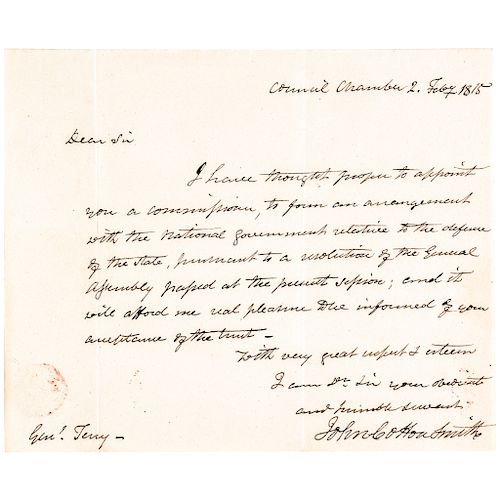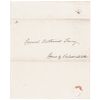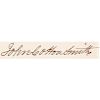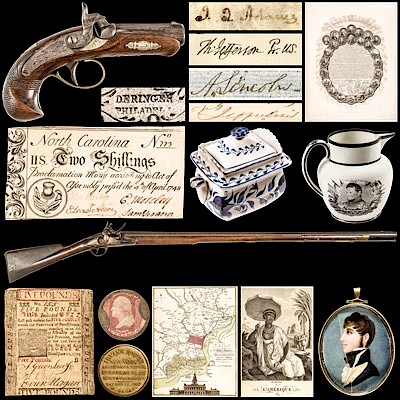1815 Conn. Governor JOHN COTTON SMITH ALS Appointments General Nathaniel Terry
Lot 98
Categories
Estimate:
$500 - $600
Absentee vs Live bid
Two ways to bid:
- Leave a max absentee bid and the platform will bid on your behalf up to your maximum bid during the live auction.
- Bid live during the auction and your bids will be submitted real-time to the auctioneer.
Bid Increments
| Price | Bid Increment |
|---|---|
| $0 | $10 |
| $200 | $20 |
| $300 | $25 |
| $500 | $50 |
| $1,000 | $100 |
| $2,000 | $200 |
| $3,000 | $250 |
| $5,000 | $500 |
| $10,000 | $1,000 |
| $20,000 | $2,000 |
| $30,000 | $2,500 |
| $50,000 | $5,000 |
| $100,000 | $10,000 |
| $200,000 | $20,000 |
| $300,000 | $25,000 |
| $500,000 | $50,000 |
About Auction
By Early American History Auctions
Oct 19, 2019
Set Reminder
2019-10-19 12:00:00
2019-10-19 12:00:00
America/New_York
Bidsquare
Bidsquare : Historic Autographs-Currency-Political-Americana-Militaria-Guns
https://www.bidsquare.com/auctions/early-american-history-auctions/historic-autographs-currency-political-americana-militaria-guns-4513
326 Lots of Rare, Historic Autographs, Americana, Civil War Era, George Washington, Abraham Lincoln, Black History, Revolutionary War Era, Colonial America, Federal Period, War of 1812, Colonial Currency, Indian Peace Medals & more... Early American History Auctions auctions@earlyamerican.com
326 Lots of Rare, Historic Autographs, Americana, Civil War Era, George Washington, Abraham Lincoln, Black History, Revolutionary War Era, Colonial America, Federal Period, War of 1812, Colonial Currency, Indian Peace Medals & more... Early American History Auctions auctions@earlyamerican.com
- Lot Description
Autographs
Governor John Cotton Smith of Connecticut Signed Letter to General Nathaniel Terry
JOHN COTTON SMITH (1765-1845). 23rd Governor of Connecticut during the 7th Lieutenant Governor, War of 1812 Period, and a member of the United States House of Representatives. Autograph Letter Signed, "John Cotton Smith" as Governor, Notice of an Important Appointment to General Nathaniel Terry, with Integral Transmittal Cover, Choice Very Fine.
Feb. 2, 1815-Dated War of 1812 Period, historic Autograph Letter Signed, "John Cotton Smith" as Governor (1812-1817), with his official notice of an important State of Connecticut Defence Post Appointment, to General Nathaniel Terry, (Commander of the Governor's Foot Guard of Hartford 1802-1813, he served as President of the Hartford Fire Insurance Company 1810-1835, and President of the Hartford Bank 1819-1828, the Mayor of Hartford 1824-1831, and also served as the General of the Connecticut State Militia), with an Integral Transmittal Cover, Choice Very Fine. This Letter is 1 page, measuring 6.25" x 7.75", Oblong 8vo., from the Governor of Connecticut, at Council Chamber, (Hartford, CT.) , addressed to General Terry. This Letter reading, in part:
"I have thought proper to appoint you a commissioner, to form an arrangement with the National Government relative to the defence of the state, pursuant to a resolution of the General Assembly proposed at the present Session; and it will afford me real pleasure to be informed of your acceptance of the trust....John Cotton Smith."
Both near fine with crisp folds.
Nathaniel Terry Jr. (January 30, 1768 - June 14, 1844) was a United States Representative from Connecticut. He was born in Enfield, Connecticut. He attended the common schools, Dartmouth College, and was graduated from Yale College in 1786. He studied law and was admitted to the bar in 1790 and commenced practice in Enfield. He moved to Hartford, Connecticut in 1796.
Terry served as Commander of the Governor's Foot Guard of Hartford 1802-1813; and as a Judge of the Hartford County Court from 1807 to 1809, when he resigned. He was a Member of the Connecticut State House of Representatives 1804-1815. He was elected as a Federalist to the Fifteenth Congress (March 4, 1817 - March 3, 1819). He was a Member of the Connecticut State Constitutional Convention in 1818.
He served as President of the Hartford Fire Insurance Company 1810-1835 and President of the Hartford Bank 1819-1828. He was the Mayor of Hartford 1824-1831 and also served as a General in the State Militia.
He died in New Haven, Connecticut in 1844 and was buried in Old North (Spring Grove) Cemetery, Hartford, Connecticut.
He was also the father of Alfred Terry, who served as a Union General during the American Civil War and Gdeneral in the Indian Wars who was to support George Armstrong Custer and his 7th Cavalry at the Battle of the Little Big Horn.
__________
Governor John Cotton Smith (February 12, 1765 - December 7, 1845) was born in Sharon, Connecticut, the son of Cotton Mather Smith, a Puritan minister who moved from Massachusetts to Connecticut. Smith completed preparatory studies and graduated from Yale College in 1783. After graduation, he studied law and was admitted to the bar. He began the practice of law in Sharon in 1787. Smith married Margaret Evertson and they had one son together.
He entered politics as a member of the Connecticut House of Representatives in 1793. He served in the State House in 1793, 1796 and 1800. In 1800 he served as speaker of that body.
Smith was elected as a Federalist candidate to the Sixth Congress to fill the vacancy caused by the resignation of Jonathan Brace. He was reelected to the Seventh, Eighth and Ninth Congresses, serving from November 17, 1800 until his resignation in August 1806. Smith was chairman of the Committee on Claims in the Seventh through Ninth Congresses.
After serving in Congress, Smith served as an associate judge of the Superior Court and Supreme Court of Errors from 1809 to 1811. He served as the 7th Lieutenant Governor of Connecticut from 1811 to 1812. He was the 22nd Governor of Connecticut from October 25, 1812 to May 8, 1817. Smith was an unsuccessful candidate for Governor on the Federalist ticket in 1817. He was the last Federalist Governor of Connecticut.
Smith retired from politics but remained involved in academic and religious organizations. He was a member of the Massachusetts Historical Society, the Connecticut Historical Society, and was elected a member of the American Antiquarian Society in 1813. He served as president of the American Bible Society from 1831 until his death in 1845. Smith died on December 7, 1845 in Sharon. He is interred in Hillside Cemetery.
Smith's home in Sharon is listed on the National Register of Historic Places.
- Shipping Info
-
Early American provides in-house worldwide shipping. Please contact us directly if you have questions about your specific shipping requirements.
-
- Buyer's Premium



 EUR
EUR CAD
CAD AUD
AUD GBP
GBP MXN
MXN HKD
HKD CNY
CNY MYR
MYR SEK
SEK SGD
SGD CHF
CHF THB
THB













